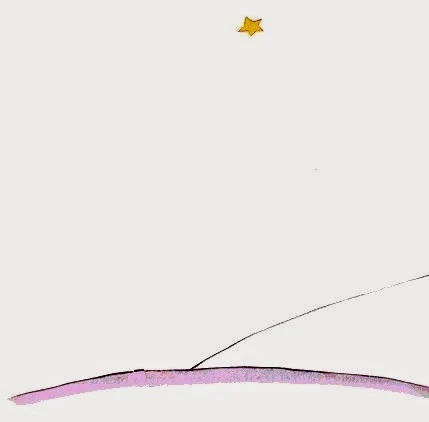Antoine de Saint_ Exupery (1900-1940).
By Marie Southard Ospina @mariesouthard a day ago
To a child, the
grown-up world can be perplexing. What is this “work” they always claim
to have? Why do they refuse to run around in fields and find shapes in
clouds? And why do they assume that children know nothing? Anyone who remembers
her child self will probably remember being completely confused by this adult
world that seemed so important, so grand, and yet, so painfully boring.
Although I
spent the majority of my childhood reading Roald Dahl, C.S. Lewis, and later
J.K. Rowling, a little novella from 1943 gave me the greatest gift of all: a
literary character I could identify with above all the rest, even Matilda.
Antoine de Saint-Exupery’s The Little Prince taught me an
important lesson back then: My lack of understanding about adulthood wasn’t
because I was unintelligent or a silly kid. It was because grown-ups are
confusing and weird and spend far too much time preoccupied with numbers and
rules and mirrors.
Looking
back, The Little Prince — its 80 pages of magic that have sold
more than 140 million copies worldwide — was full of lessons that prepped us
for adulthood. And, reading it now, the pages still ring true; it doesn’t just
teach kids about being grown-ups, it teaches grown-ups about how to be better grown-ups.
Remember to look beyond the surface.
Pin it
When the
narrator draws a boa constrictor digesting an elephant, all the grown-ups
around him see is a hat. Their interpretations are dull and lifeless; their
imaginations long gone. Feeling defeated, the little prince abandons a
“magnificent career as an artist” — all because adults refused to see or feel.
Pin it
Once the little
prince begins hinting at his plans to explore new planets, his flower — whom he
has nurtured and cared for — claims not to need him and to be self-sufficient.
And so, the little prince abandons her, even though he “ought to have realized
the tenderness underlying her silly pretensions.”
Pin it
On the first
planet he visits, the little prince meets a king who encompasses the entire
population of the planet, and claims to reign over everything. Though the
little prince can’t fathom what it is he actually does, the king teaches the
hero that judging yourself is far more difficult, and at times far more
important, than judging others. It is only through judging ourselves that we
can grow as individuals.
Pin it
On the second
planet, the little prince meets a vain man who spends his time admiring
himself, and seeking the admiration of others. But living for the admiration of
others is to never live for oneself. And living for only oneself is to never
love or care for another.
Drinking to forget is a vicious and ultimately feeble endeavor.
The drunkard
drinks to forget he is ashamed. The drunkard is ashamed because he drinks. To
the little prince, it seems very strange for a man to spend his days in such a
manner when he could be doing far more exciting things (like planting flowers).
But to us grown-ups, its a reminder of a vicious cycle, and one that only ever
ends in more sadness and despair.
Pin it
The little
prince meets a businessman who counts all the stars in the galaxy so that he
can own them. “I manage them. I count them and then count them again. It’s
difficult work. But I’m a serious person.” But being too serious has landed him
a monotonous life, a lonely life, and a life in which he does not even
appreciate the beauty of the stars he owns.
Don’t forget to enjoy your life — take a moment and take it all in.
It is the
lamplighter of the 5th planet who gains the little prince’s respect, for he
follows his orders dutifully to switch the lamplight on and off through the
day. But because his planet revolves once a minute, he never gets a moment of
rest. A month goes by in a minute. And a lifetime in a few days.
Pin it
When the little
prince meets a geographer who refuses to explore his own world because he is
too busy researching far-off lands, we learn that it is far too easy to fall
into the trap of investigating into the places we wish to explore, but never
actually going anywhere.
Pin it
Foxes are often
depicted as tricksters or villains, but this fox simply needed companionship —
friendship. And it is the fox who bestows upon the little prince three
important life lessons.
- “One sees clearly only
with the heart. Anything essential is invisible to the eyes.”
- “It’s the time you
spent on your rose that makes your rose so important.”
- “You become
responsible for what you’ve tamed.”
Pin it
Even amidst a
garden of beautiful roses, the little prince cannot escape thoughts of his own
rose — he just can’t replace her. “One couldn’t die for you. Of course, an
ordinary passerby would think my rose looked just like you. But my rose, all on
her own, is more important than all of you together, since she’s the one I’ve
watered.”
Pin it
Even though the
narrator — a lonely and stranded pilot — has come to know and love the little
prince; he knows that to keep him on Earth would be to hurt his friend. Before
the little prince leaves, he tells the pilot, “In one of the stars I shall be
living. In one of them I shall be laughing. And so it will be as if all the
stars were laughing, when you look at the night sky.” Sometimes you have to let
people go, because to keep them would be to trap them. But letting them go can
be the truest demonstration of love there is.
Fuente: file:///C:/Users/usuario/Downloads/11%20Ways%20the%20'The%20Little%20Prince'%20Prepared%20Us%20for%20Adulthood%20%20%20Bustle.htm










